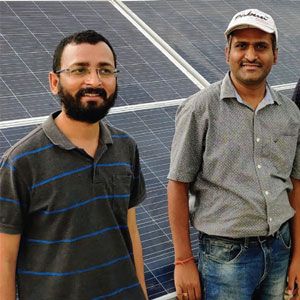
The Indian EV industry is predicted to reach $113.99 billion by 2029, at a compound annual growth rate of 66.52 percent as per a report published under India Electric Vehicle Market Share & Forecast Analysis, 2029. The major drivers of growth in 2023 will be changes in government policies, the manufacture of batteries at a reasonable price, and infrastructural expansion. In a price-sensitive nation like India, where the adoption of EVs is partly impacted by afford ability and sustainability, EVs offer a more practical, long-term solution to rising oil prices. Their increased popularity is partly ascribed to the fact that they are less expensive to operate and maintain than conventional petrol powered automobiles.
Dabun was established in Dec 2021 with the intention of accelerating the nation's ongoing ‘Solar Revolution,’ and plans to collaborate with groups already doing excellent work while attempting to make a unique contribution to the ecosystem. “We are largely concentrating on renewable energy, and when you talk about renewable energy, battery storage, or energy storage, is obviously a crucial component. So, from a business standpoint, that is our main focus right now”, speaks Navnit Singh, Founder, Dabun. The corporation is making great efforts to achieve that goal because it thinks technology should benefit everyone in the system, not just the top users.
Innovating power efficient batteries
Dabun was the first to deliver a 100 percent domestic battery-less hybrid solar PCU to the Indian market. This was followed by the introduction of lithium batteries for solar sets, particularly larger kVA batteries, which proved to be difficult for Indian enterprises to implement. “We are largely in the manufacturing business, and batteries are one of our main product categories. We offer conventional acid batteries as well as DPM for lithium phosphate batteries, which are currently dominating the market. We also have cutting-edge vanadium redox flow batteries, which we are already selling on the market. In fact, I believe we are one of the few companies in the world that sell this particular type of battery”, says Navnit. Dabun also introduced Sun tracker technology to solar rooftops for the first time in India, a feature that was previously only accessible in utility-scale solar power facilities.
We are pleased to say that the use of technology has allowed us to maintain affordable prices through improved productivity & reduced waste
Dabun’s goal has always been to provide clients with novel experiences and is perhaps one of the few businesses in India that manufacture its own solar panels, PCUs, batteries, structures, installations, and more, rather than putting together plants from components from various suppliers. This enables the business to assume all responsibility for the plant and offer the client an efficient, consolidated warranty and support.
“We are pleased to say that the use of technology has allowed us to maintain affordable prices through improved productivity and reduced waste”, shares Navnit. Dabun does not sacrifice quality in order to cut its pricing; the firm's work is still the least expensive when compared to similar-quality products, and this has been made possible by some shrewd adjustments and the adoption of traditional tactics.
“According to predictions, battery technologies will transform the Indian market within the next one to two years. Regardless of any technological improvements that may have happened at that time, we want to play a significant part in introducing these technologies to the Indian market, keep one step ahead of the competition, and offer a distinctive product to the market”, signs off Navnit. The company is also attempting to automate as many of the manufacturing processes or the quality control facilities as possible in the hopes that it will become a significant participant in this ecosystem within the next two to three years.
We use cookies to ensure you get the best experience on our website. Read more...